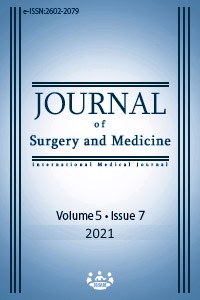Approach to difficult urethral catheterizations in male patients during the Covid-19 pandemic
Keywords:
Difficult urethral catheterization, Hydrophilic guidewire, Urethral dilatation, COVID-19Abstract
Background/Aim: Difficult urethral catheterization (DUC) is a frequent urological emergency in daily practice. Anticoagulant and antiaggregant drugs, included in the treatment protocols for COVID-19, tend to increase the risk of possible complications of alternative interventions, such as cystoscopy and suprapubic percutaneous cystostomy. Therefore, a less invasive method is needed in patients with DUC. This study aims to evaluate the results of Foley catheter insertion and urethral dilatation over a hydrophilic guidewire in patients with DUC. Methods: A total of 23 male patients who visited the urology outpatient clinic or were referred due to urinary retention or inability to place a Foley catheter in the last 8 months were included in this case series. The patient charts were evaluated retrospectively. After the hydrophilic guidewire, blindly advanced from the urethral meatus under sterile conditions, reached the bladder, a Foley catheter was placed over the guidewire. In cases of urethral stricture, dilatation was performed over the guidewire with the help of hydrophilic S-Curve dilators, and a Foley catheter of suitable diameter was placed. Results: A Foley catheter was successfully placed in 22 out of 23 patients. Urethral dilatation was performed in 13 patients due to urethral stricture, and a transurethral Foley catheter was placed in the other 10 patients without the need for dilatation. Although most of our patients (17 of 23 patients) were receiving anticoagulant or antiaggregant treatment during the procedure, no significant hemorrhagic complications occurred. A Foley catheter could not be placed in one patient with this technique; a percutaneous cystostomy catheter was placed instead. Conclusion: The results of this study, conducted during the COVID-19 pandemic, show that our technique is safe and successful. We believe that our technique will be useful in preventing additional surgical interventions due to complications, especially during this pandemic.
Downloads
References
Villanueva C, Hemstreet GP, 3rd. Difficult male urethral catheterization: a review of different approaches. International Braz J Urol. 2008;34(4):401-11; discussion 12. Epub 2008/09/10. doi: 10.1590/s1677-55382008000400002. PubMed PMID: 18778491.
Ficarra V, Novara G, Abrate A, Bartoletti R, Crestani A, De Nunzio C, et al. Urology practice during the COVID-19 pandemic. Minerva Urologica e Nefrologica. 2020;72(3):369-75. Epub 2020/03/24. doi: 10.23736/s0393-2249.20.03846-1. PubMed PMID: 32202401.
Ribal MJ, Cornford P, Briganti A, Knoll T, Gravas S, Babjuk M, et al. European Association of Urology Guidelines Office Rapid Reaction Group: An Organisation-wide Collaborative Effort to Adapt the European Association of Urology Guidelines Recommendations to the Coronavirus Disease 2019 Era. European urology. 2020;78(1):21-8. Epub 2020/05/08. doi: 10.1016/j.eururo.2020.04.056. PubMed PMID: 32376137; PubMed Central PMCID: PMCPMC7183974.
Aguilera PA, Choi T, Durham BA. Ultrasound-guided suprapubic cystostomy catheter placement in the emergency department. The Journal of Emergency Medicine. 2004;26(3):319-21. Epub 2004/03/19. doi: 10.1016/j.jemermed.2003.11.016. PubMed PMID: 15028331.
Tang N, Bai H, Chen X, Gong J, Li D, Sun Z. Anticoagulant treatment is associated with decreased mortality in severe coronavirus disease 2019 patients with coagulopathy. Journal of Thrombosis and Haemostasis JTH. 2020;18(5):1094-9. Epub 2020/03/29. doi: 10.1111/jth.14817. PubMed PMID: 32220112.
Cook TM, El-Boghdadly K, McGuire B, McNarry AF, Patel A, Higgs A. Consensus guidelines for managing the airway in patients with COVID-19: Guidelines from the Difficult Airway Society, the Association of Anaesthetists the Intensive Care Society, the Faculty of Intensive Care Medicine and the Royal College of Anaesthetists. Anaesthesia. 2020;75(6):785-99. Epub 2020/03/30. doi: 10.1111/anae.15054. PubMed PMID: 32221970; PubMed Central PMCID: PMCPMC7383579.
Lowe MA, Defalco AJ. New endourologic technique for catheter placement after TURP, prostatectomy, and difficult urethroscopy. Urology. 1992;40(5):461-3. Epub 1992/11/01. doi: 10.1016/0090-4295(92)90466-a. PubMed PMID: 1441048.
Krikler SJ. Flexible urethroscopy: use in difficult male catheterisation. Annals of the Royal College of Surgeons of England. 1989;71(1):3. Epub 1989/01/01. PubMed PMID: 2923416; PubMed Central PMCID: PMCPMC2498880.
Rozanski TA, Salazar F, Thompson IM. Direct vision bladder catheterization using a short rigid ureteroscope. Urology. 1998;51(5):827-8. Epub 1998/06/04. doi: 10.1016/s0090-4295(98)00012-0. PubMed PMID: 9610600.
Freid RM, Smith AD. The Glidewire technique for overcoming urethral obstruction. The Journal of Urology. 1996;156(1):164-5. Epub 1996/07/01. PubMed PMID: 8648783.
Zammit PA, German K. The difficult urethral catheterization: use of a hydrophilic guidewire. BJU international. 2004;93(6):883-4. Epub 2004/03/31. doi: 10.1111/j.1464-410X.2003.04732.x. PubMed PMID: 15050011.
Mistry S, Goldfarb D, Roth DR. Use of hydrophilic-coated urethral catheters in management of acute urinary retention. Urology. 2007;70(1):25-7. Epub 2007/07/28. doi: 10.1016/j.urology.2007.03.032. PubMed PMID: 17656201.
Villanueva C, Hemstreet III GP. Experience with a difficult urethral catheterization algorithm at a university hospital. Current Urology. 2010;4(3):152-5.
Simonato A, Giannarini G, Abrate A, Bartoletti R, Crestani A, De Nunzio C, et al. Clinical pathways for urology patients during the COVID-19 pandemic. Minerva Urologica e Nefrologica. 2020;72(3):376-83. Epub 2020/04/01. doi: 10.23736/s0393-2249.20.03861-8. PubMed PMID: 32225135.
Beaghler M, Grasso M, 3rd, Loisides P. Inability to pass a urethral catheter: the bedside role of the flexible cystoscope. Urology. 1994;44(2):268-70. Epub 1994/08/01. doi: 10.1016/s0090-4295(94)80148-7. PubMed PMID: 8048205.
Blitz BF. A simple method using hydrophilic guide wires for the difficult urethral catheterization. Urology. 1995;46(1):99-100. Epub 1995/07/01. doi: 10.1016/s0090-4295(99)80169-1. PubMed PMID: 7604486.
Downloads
- 174 363
Published
Issue
Section
How to Cite
License
Copyright (c) 2021 Hüseyin Koçakgöl
This work is licensed under a Creative Commons Attribution-NonCommercial-NoDerivatives 4.0 International License.
















